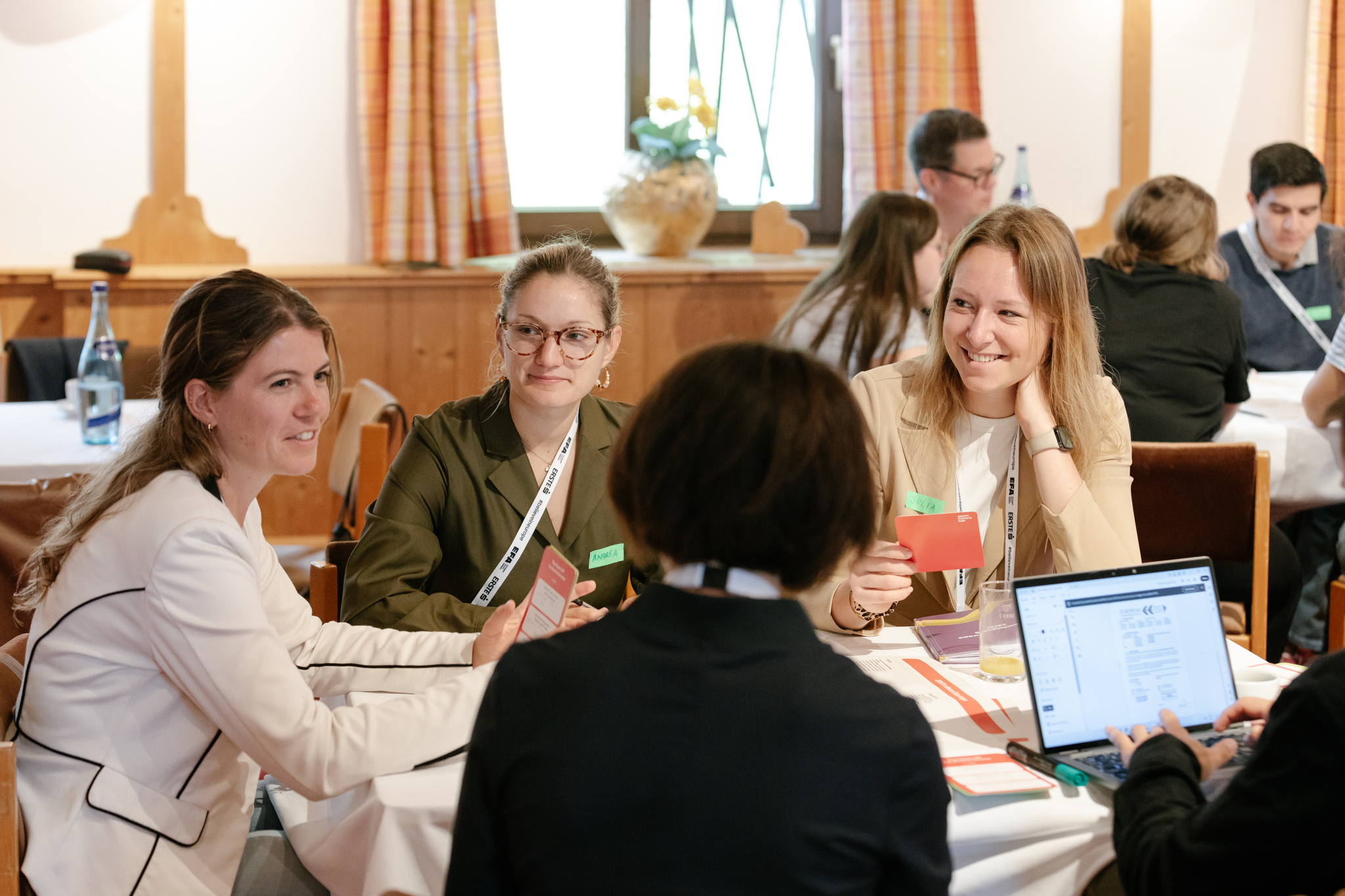Workshop
Befriending our Future Selves:
From Imagination to Action
What is the European Forum Alpbach?
Since its founding in 1945 as the International University Weeks of the Austrian College in Alpbach, what later became the European Forum Alpbach (EFA) has provided a space for reflection and debate shaped by a commitment to democratic values in Europe. It began as a gathering of young intellectuals responding to post-war authoritarian ideologies and has since developed into a cross-generational, cross-disciplinary meeting point where policymakers, artists, scientists, business leaders, and civil society discuss Europe’s future.
In 2025, on its eightieth anniversary, EFA invited participants to “Recharge Europe”—a theme calling for renewed attention to Europe’s founding principles of democracy, human rights, the rule of law, and social solidarity. This was the context for our workshop, “Befriending Our Future Selves: From Imagination to Action,” which we brought to Alpbach with the support of Erste Foundation.
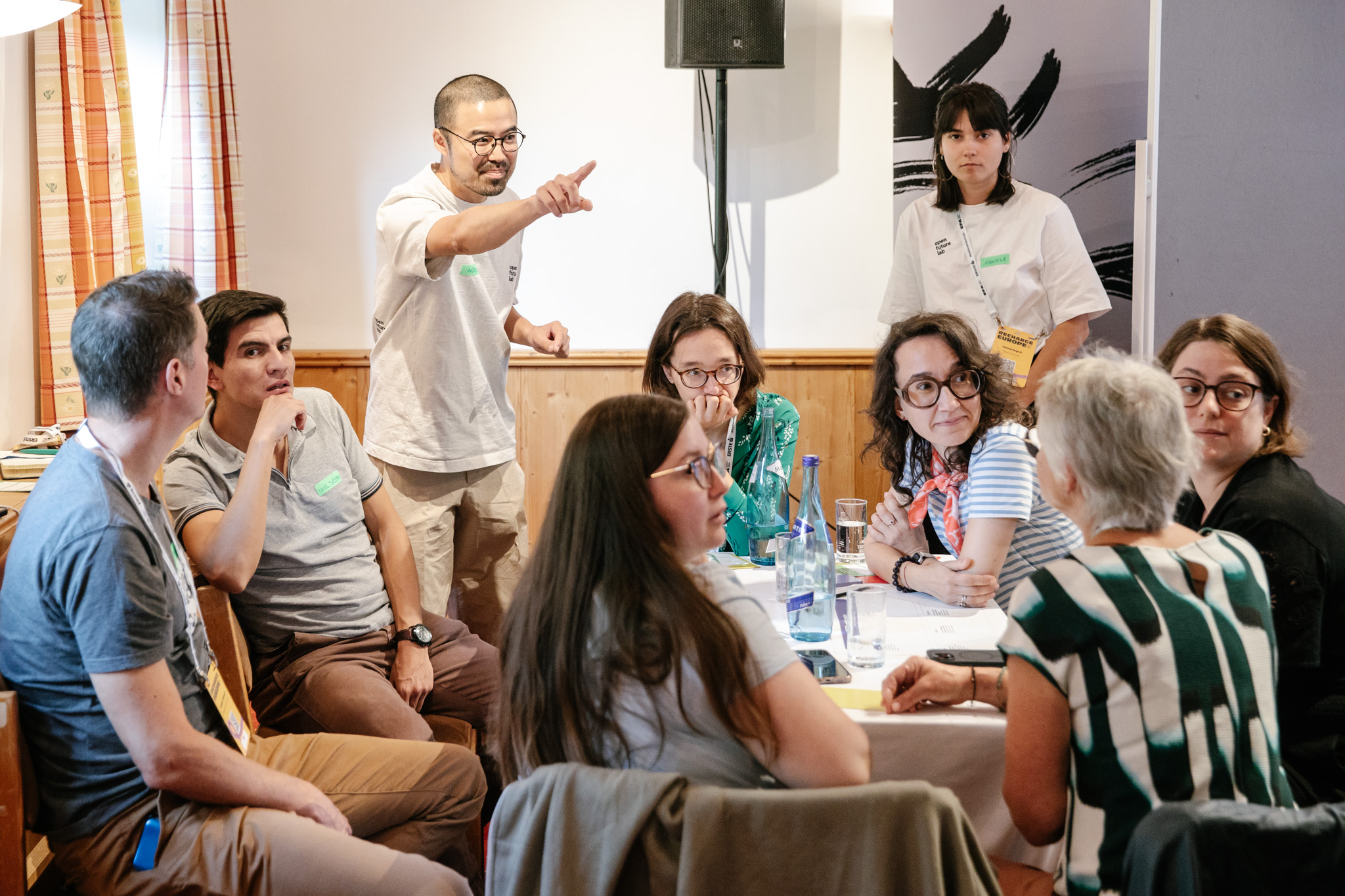
The background
For us, EFA offered a chance to test a method we have been developing: using shared imaginative activities as a form of research in itself. We wanted to see how people, when guided through encounters with their future selves, might discover new insights into financial wellbeing, resilience, and community.
At the core of our current research interests is the idea that none of us has just one future self as we often tend to imagine, and our multiple future selves are entangled with the multiple future selves of others. We are therefore interested in thinking about how futures are fundamentally collective and interdependent. Financial well-being, for example, is not simply about one person’s savings or pension pot. It is also about trust, community, and the infrastructures that allow us to feel secure and enjoy our lives.
As a society we’re developing more and more sophisticated tools to predict and control the future with information. But knowing abstract futures expressed in numbers seems to have the curious effect of often making it more difficult for us to act on our futures. That is why we need a “mode of prediction not found in charts and statistics.” These are words the philosopher John Dewey used to describe art in 1934, but they could easily apply to what we feel is needed in navigating the sea of data and information that prevents us from building a relationship with our future selves.
In the same book, Dewey also wrote about friendship: friendship is “not the result of information about another person” but the result of “sympathy through the imagination.” This could easily apply to our futures and future selves. We may have more information about our possible future selves, but we struggle to engage with them with “sympathy through the imagination.” This is why we entitled our workshop “befriending” our future selves, to explore ways of making that kind of engagement with future selves possible.
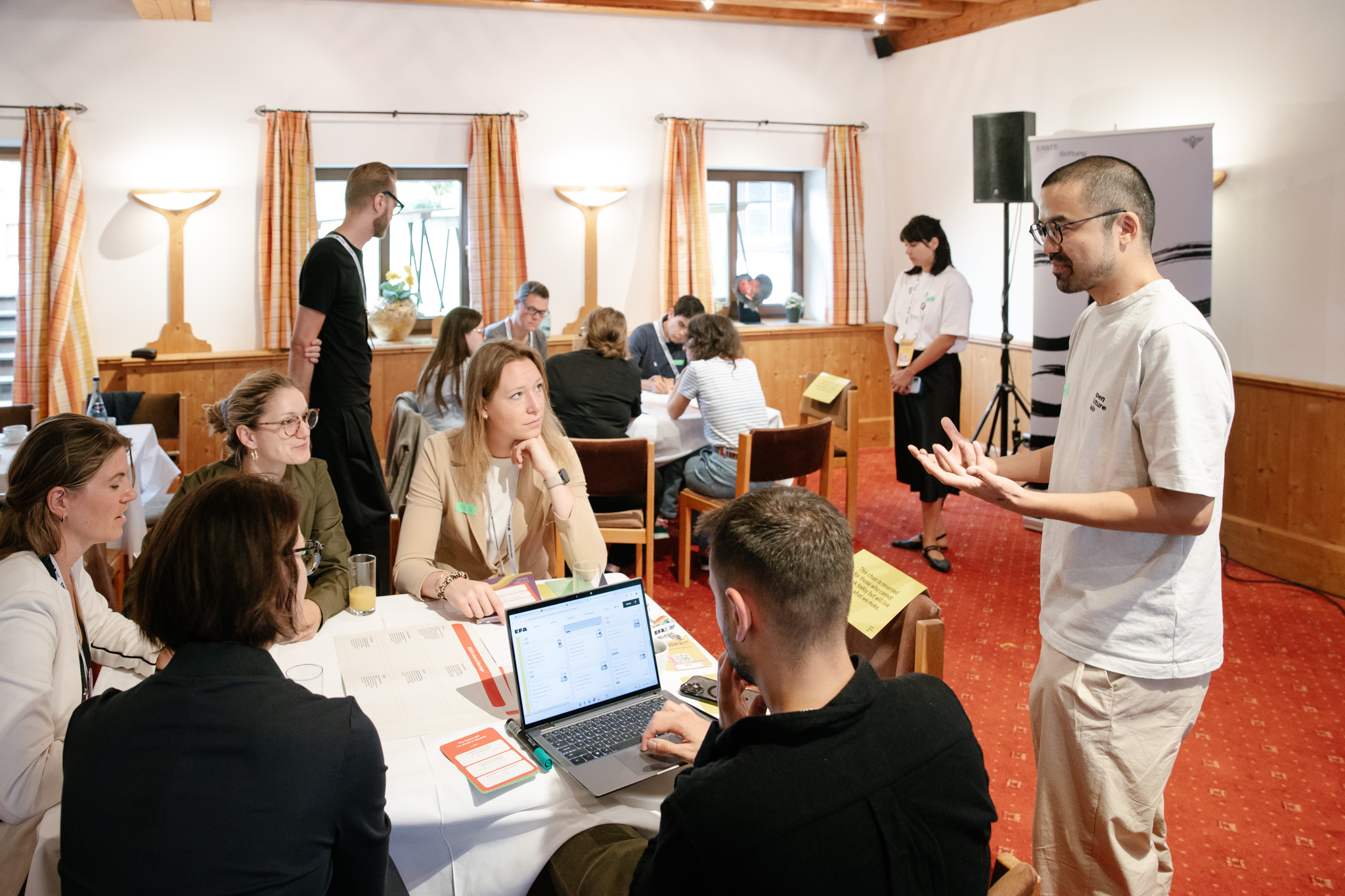
The workshop format
Our three-hour session was designed to embody these principles. It unfolded in four stages:
- Future Selves Speak – Based on insights from possible-self theory in psychology, a guided meditation invited participants to encounter three versions of themselves in 2050: their expected self, their hoped-for self, and their feared self. Each participant received three colour-coded cards with prompts to write their reflections. The feared-self card was then collected anonymously into a shared box.
- Group Sense-Making – Now sitting in groups, participants drew one feared-self card at random and worked together to articulate the “shared blockage” it revealed, meaning what was blocking the “feared self” from becoming the hoped-for self. Using a worksheet as guidance, they asked: What is this blockage? How does it appear in everyday life? What creates and sustains it? What are the economic forces that contribute to it? Who is most affected?
- Rehearsing Futures – Groups then shifted gears: imagining themselves as collectives in 2050 who create public messages to respond to that blockage. With the help of another worksheet, they were invited to create the messages, considering not only the words or images but also their intention, location, and audience.
- Sharing and Discussion – Each group presented their blockage and messages, posting them on the wall as a miniature exhibition of futures. We closed with a short reflection round and an additional card for participants to take home, carrying a small promise to their future selves.
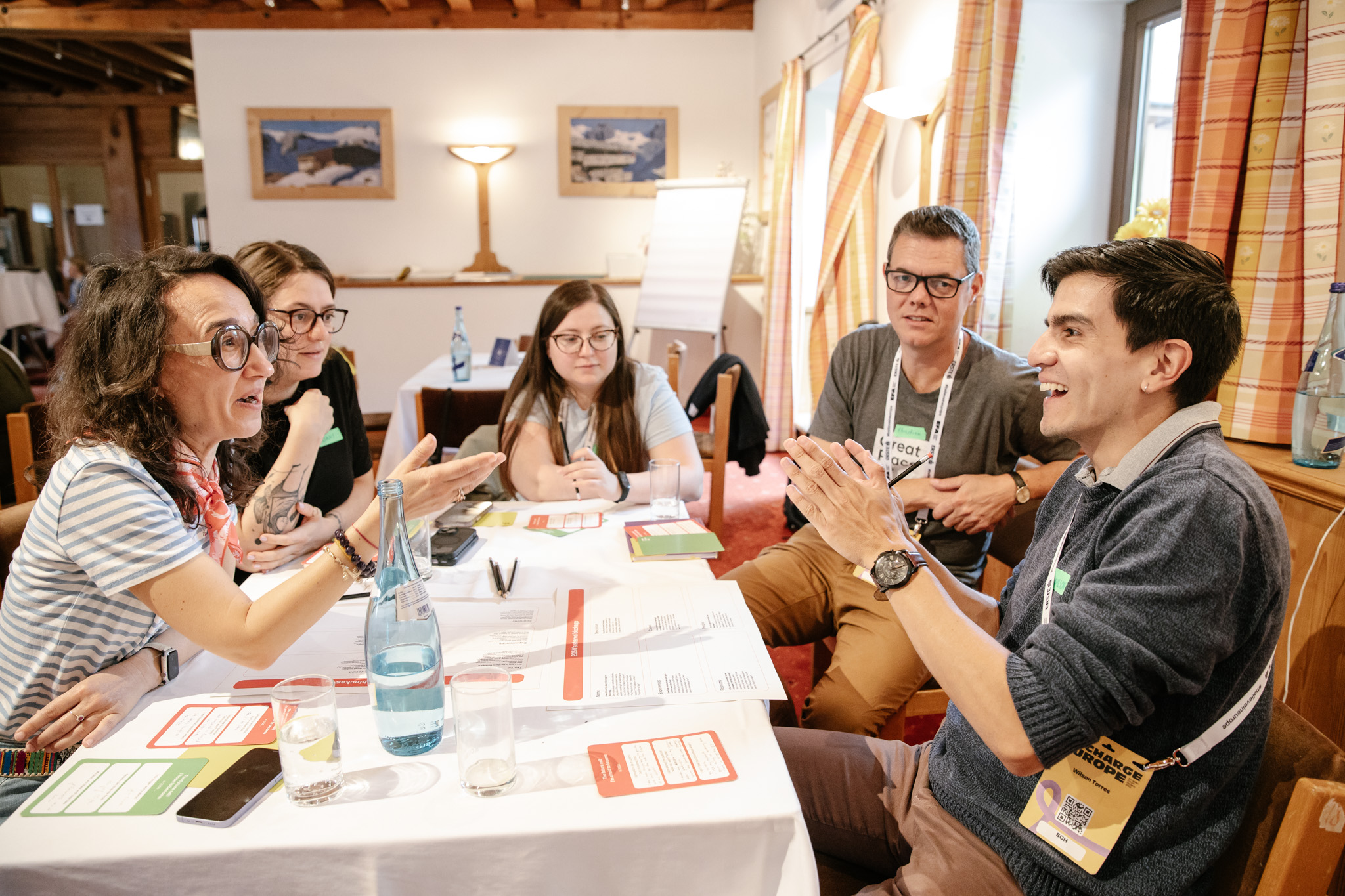
What happened in the workshop
Fourteen participants attended our workshop. This smaller scale created an intimate atmosphere that was appropriate for an emotionally charged format that we had not tried before.
As participants filled in their three-selves cards, a collective murmur gave way to silence. Some found it difficult to fill in, while others had no issues and swiftly moved on to their coffee break after putting their feared-self card into a box. When redistributed, the act of reading another’s feared-self translated something that was private into something shared.
The group sense-making surfaced recurring shared blockages:
- Loneliness and isolation in hyper-connected societies.
- The struggle to act due to the fear of the unknown.
In the public message phase, discussions flourished. In fact, perhaps even more than the outcomes themselves, what was crucial was these exchanges. Nevertheless, the outcomes were also highly revealing. One group imagined signs scattered through urban transport hubs reading “Let’s Just Do It Together,” and “You Belong.” The call for belonging was extended to non-human beings too, as the drawing of a tree that accompanied the message signalled. Another group created a prototype of a four-sided mirror, with a message on each side. One side said, “Talk to Me,” a message people would see while seeing their own reflection. Although the intention was to instigate conversation with each other, for us it also poetically reminded us that we need to take time to talk with ourselves.
What was interesting to notice was how groups struggled to come to a consensus on what messages to produce. Such difficulties reflect the difficulties in real life—in groups, in social movements, even within more private settings like families—where we struggle to agree on a path. But this is how it should be. Our relationship with the future should not be determined by one expert view or even an AI system that chooses a path for us based on some data. The future needs to be collectively negotiated. This was also reflected in how groups echoed each other in finding value in encouraging people to be physically together.
On inhabiting uncomfortable realities
The workshop will be improved and we received valuable feedback on how to do so. We need to simplify worksheets and guide participants better through the phases, clearly specifying the goals of each phase. We also need to make sure that our understanding of financial well-being on which our work is based, should continue to surface throughout the workshop.
We were also told that the workshop was emotionally heavy. Some participants found it difficult to move away from the feared self, which made the entire session depressing. Looking back, we could have included a more explicit step of transition, helping participants to re-anchor in hope. It is critical that participants feel safe and we need to take steps to ensure that.
But we also believe there is value in staying with discomfort. We know from the interviews we did in our previous research that people live very difficult realities. We need to train our imagination muscles to be able to inhabit those difficult realities so that we can really start building that “sympathy through the imagination.” We do not know what the futures will bring. Someone else’s difficult reality might be our own one day.
This is particularly important for contexts like EFA, where, as political scientist Yascha Mounk remarked in one session, participants are “profoundly unrepresentative” of the larger population as most arrive from privileged contexts. It is therefore crucial to keep open those channels to connect with ordinary realities, and we hope to continue to play a role in that.
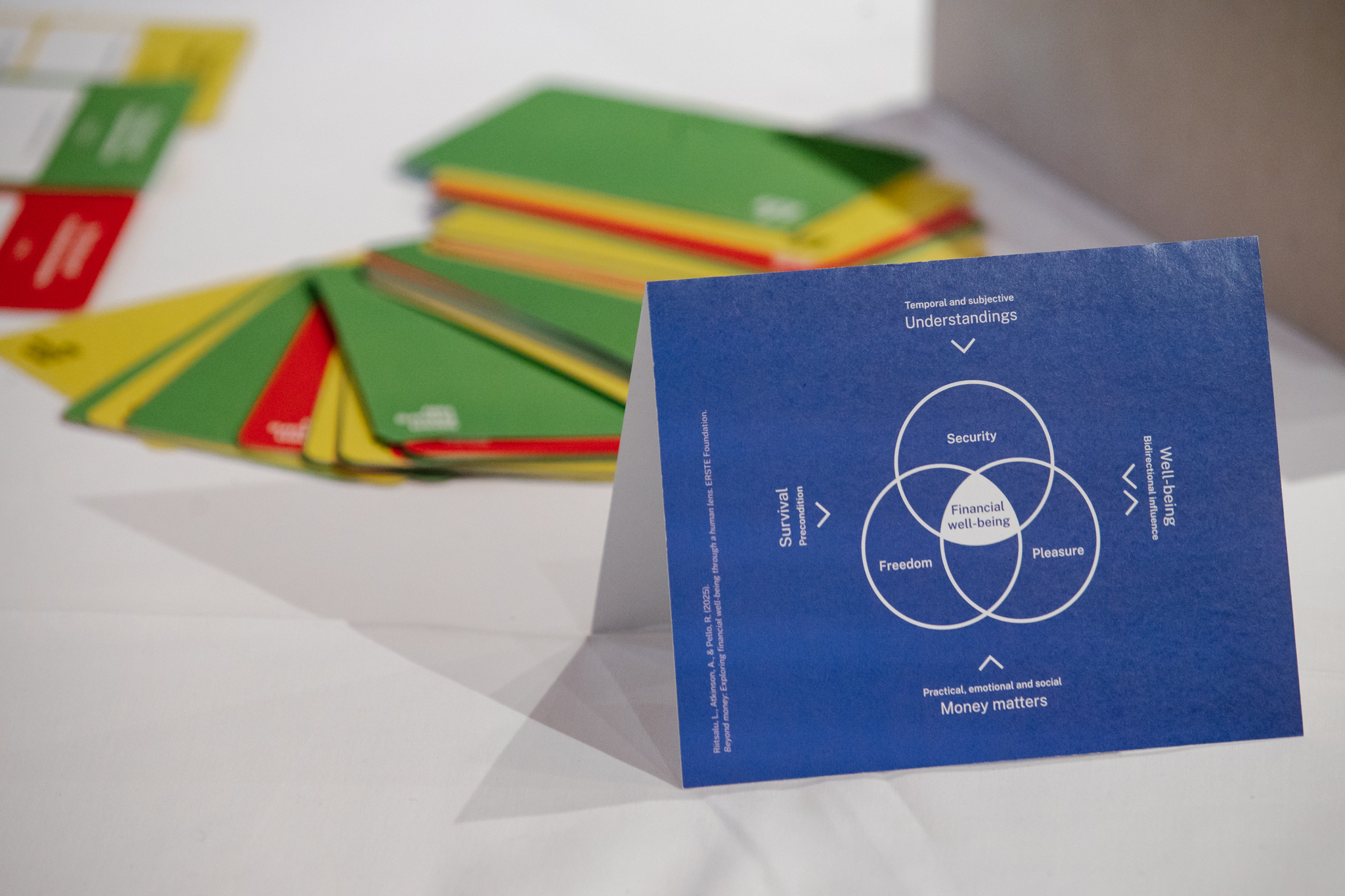
Moving Forward
The workshop at Alpbach was a meaningful experiment and it will allows us to iteratively improve it. Despite the need to improve certain aspects, the format already showed us that imagination, when structured carefully, can open new ways of engaging with financial wellbeing, community, and responsibility toward our future selves.
We are making the assets of the workshop publicly available—including the Three-Selves Cards and Worksheets. You are welcome to use them, adapt them, and test them in your own contexts. If you do, we would love to hear what happened and what you learned.
At Alpbach, we tried to stage a simple act: to start building a relationship with our future selves. This act is not easy. It requires courage to face feared futures, generosity to imagine for others, and humility to recognise that the future is already entangled with our present choices and actions. In those three hours in an alpine seminar room, we felt that futures were present, calling us to act together in the present.

